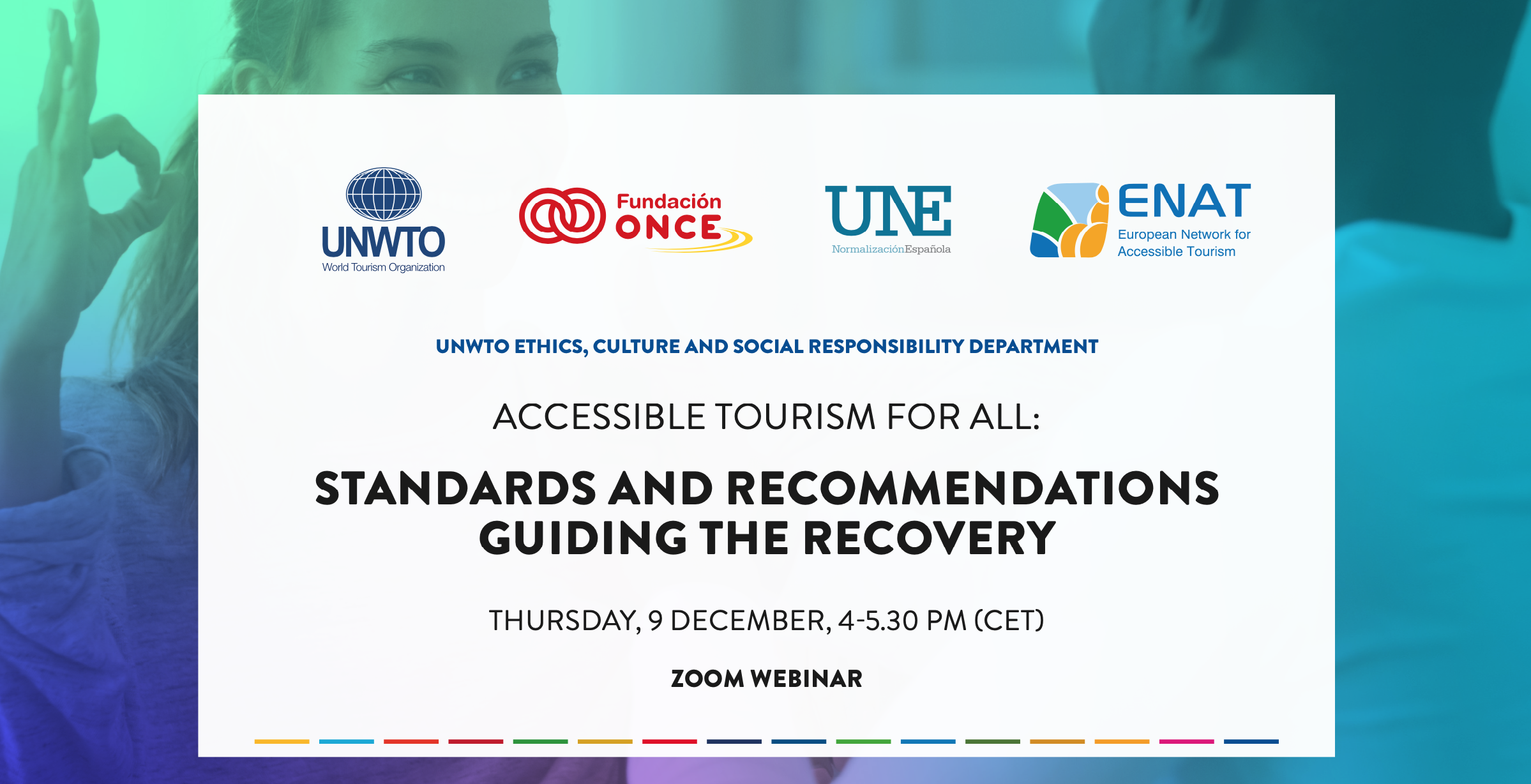UNWTO Webinar. Accessible Tourism for All: Standards and Recommendations Guiding the Recovery
Share on social media
Thursday, 9 December 2021, 4.00PM to 5:30PM CET (Madrid Time) via Zoom. Update: See the video and conclusions.
 Thursday, 9 December 2021, Update: See the video link below and download the Conclusions.
Thursday, 9 December 2021, Update: See the video link below and download the Conclusions.
UNWTO joined hands with the ONCE Foundation for Cooperation and Social Inclusion of People with Disabilities and the Spanish Association for Standardization, UNE, in 2016, to lead the development of a comprehensive standard on accessibility, under the International Standards Organisation (ISO) framework.
The recently published standard ISO 21902:2021, as well as other tools launched by UNWTO since 2020, can serve to support the tourism industry to better recover from the pandemic by reaching out to customers with specific access requirements, tapping into new sources of revenue and becoming truly inclusive.
This webinar will shed light on the new normative instruments and recommendations by gathering technical experts and featuring good practices in accessible and inclusive tourism. It is aimed at encouraging both public and private sector stakeholders to plan and implement their own accessibility agenda.
This webinar is not about complying with requirements, but rather about grasping the wealth of opportunities that accessible tourism entails.
Programme
Visit the UNWTO Webpage to read the programme
Download the Webinar Programme in PDF format from the right-hand panel.
Update 16 December 2021. Watch the Webinar on YouTube (1 hour 42 minutes, Spanish/English/Spanish sign language)
Background
 Photo by UNWTO.
Photo by UNWTO.
Enabling access to tourism infrastructure, services and experiences for persons with specific access requirements has become increasingly important for companies and destinations.
However, many tourism providers still don’t know how to improve their accessibility to be able to better cater to both travellers and locals with disabilities, reaching over 1 billion people worldwide.
Service providers, public administrations and destination authorities require common concepts and guidance on accessibility, so all key players can understand and speak the same language.
Generally, there has been a lack of international standards on accessible tourism and major gaps within national legislative and normative frameworks.
Accessibility specifications and indicators differ between different countries or regions. This causes confusion and stressful travel planning for customers who need good access, frequently leading to bad travel experiences.
After the Webinar: Takeaway thoughts and conclusions
Global shocks make us realize that advocating for inclusiveness, accessibility and diversity, is good for tourism and good for people.
Adopting a “joint efforts” approach
- Decision makers of different sectors need to sit together to draft policies and strategies by adopting problem-solving approaches, driven by data and market research.
- International accessibility standards and recommendations are not about stating “I comply with this”. They are guidance tools for destinations and companies to assess and improve their accessibility.
- Businesses can be incentivized by tailoring public funding schemes to include accessibility measures. Requiring “accessibility” as a condition for receiving funds for recovery packages, infrastructure works or events can motivate service providers.
Driving innovation
- Accessible tourism experiences should happen in beautiful and welcoming environments, designed for all kinds of customers, with or without disability.
- Inclusion drives innovation, service quality and business success. Accessibility and respect for diversity create an environment of belonging for both staff and customers, leading to decent work, new revenue streams and clients’ loyalty.
- National strategies require coordination bodies and a focus on specific territories and service providers. Involving the end-users and qualified experts is key: ‘nothing about us, without us’.
Changing the mindset
- When we are told that something is simply not accessible, we should ask: “What is so unique about it that it justifies exclusion of millions of users”?
- Changing our mindset, and understanding the business case of accessibility, are still the key challenges. That’s why training at both executive and front-desk staff level is a must.
- Making destinations accessible NOW is paving the way for the FUTURE - places where locals and visitors alike, can spend quality time throughout their lives, and at any age.
Downloads (PDFs) from the right-hand panel
- Takeaway thoughts and conclusions
- Lecciones aprendidas & conclusiones
